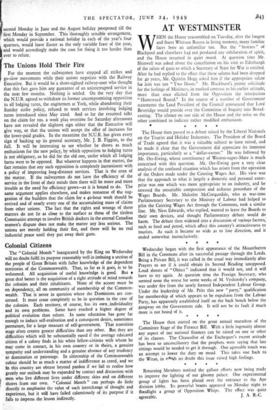Colonial Citizens
The "Colonial Month" inaugurated by the King on Wednesday will no doubt fulfil its purpose reasonably well in imbuing a section of the people of Great Britain with fuller knowledge of the dependent territories of the Commonwealth. That, so far as it goes, is to be welcomed. All acquisition of useful knowledge is good. But a great deal better is the acquisition of a right attitude of mind towards the colonies and their inhabitants. None of the accent must be on dependency, all on community of membership of the Common- wealth. That is never in question where the Dominions are con- cerned. It must cease completely to be in question in the case of the colonies. Each territory, of course, has its own,individuality and its own problems. Some have reached a higher degree of political evolution than others. In some education has gone far enough to induce self-realisation and a consequent desire, sometimes premature, for a large measure of self-government. That transition stage often creates greater diffia.ties than any other. But they are difficulties which will be substantially eased if the average educated citizen of a colony finds in his white fellow-citizens with whom he may come in contact, in his own country or in theirs, a genuine sympathy and understanding and a genuine absence of any tendency to domination or patronage. In citizenship of the Commonwealth colour should be as much a matter of indifference as creed, and we in this country are obtuse beyond pardon if we fail to realise how greatly our outlook may be expanded by contact and discussion with men who live different lives under different skies and on different shores from our own. " Colonial Month " can perhaps do little directly to emphasise the value of such interchange of thought and experience, but it will have failed calamitously of its purpose if it fails to impress the lesson indirectly.


































 Previous page
Previous page